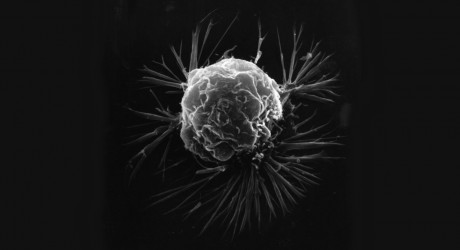Researchers at the Hebrew University of Jerusalem have developed a promising new diagnostic tool that could revolutionize cancer diagnosis and treatment. Combining nanotechnology and machine learning, this innovative method offers a highly accurate way to predict cancer cell behavior.
The current methods for diagnosing cancer, such as imaging scans and biopsies, often have limitations. They can be invasive, expensive, time-consuming, and may not provide a clear picture of the dynamic nature of cancer at the cellular level. This can lead to delays in treatment and even misdiagnosis.
The new tool, detailed in the journal Science Advances, addresses these shortcomings. Led by doctoral student Yoel Goldstein and Prof. Ofra Benny from the Hebrew University School of Pharmacy, the research team developed a method that utilizes a combination of nanoinformatics and machine learning (ML).
Will you offer us a hand? Every gift, regardless of size, fuels our future.
Your critical contribution enables us to maintain our independence from shareholders or wealthy owners, allowing us to keep up reporting without bias. It means we can continue to make Jewish Business News available to everyone.
You can support us for as little as $1 via PayPal at office@jewishbusinessnews.com.
Thank you.
Here’s how it works: Cancer cells are exposed to particles of different sizes, each identified by a unique color. The researchers then measure the amount of each particle absorbed by the cells. By analyzing these uptake patterns using ML algorithms, the tool can predict crucial cell behaviors, such as a cell’s response to medication and its potential to spread (metastasize).
“The beauty of this method lies in its ability to differentiate between seemingly identical cancer cells that behave differently on a biological level,” explains Goldstein. “This level of precision is achieved by analyzing how the cells absorb microscopic and nanoparticle-sized particles. This ability to collect and interpret entirely new types of data opens doors for the development of novel diagnostic tools that have the potential to revolutionize how we treat and diagnose cancer.”
The research has significant implications for personalized medicine. “This discovery offers the potential to use cells from patient biopsies to rapidly predict disease progression or resistance to chemotherapy,” says Prof. Benny. “Furthermore, it could pave the way for innovative blood tests that assess the effectiveness of targeted immunotherapy treatments.”
This new method holds immense promise for improving cancer diagnosis and treatment. Offering a fast, accurate, and potentially non-invasive way to predict cancer cell behavior could lead to more effective treatment strategies and improved patient outcomes.




